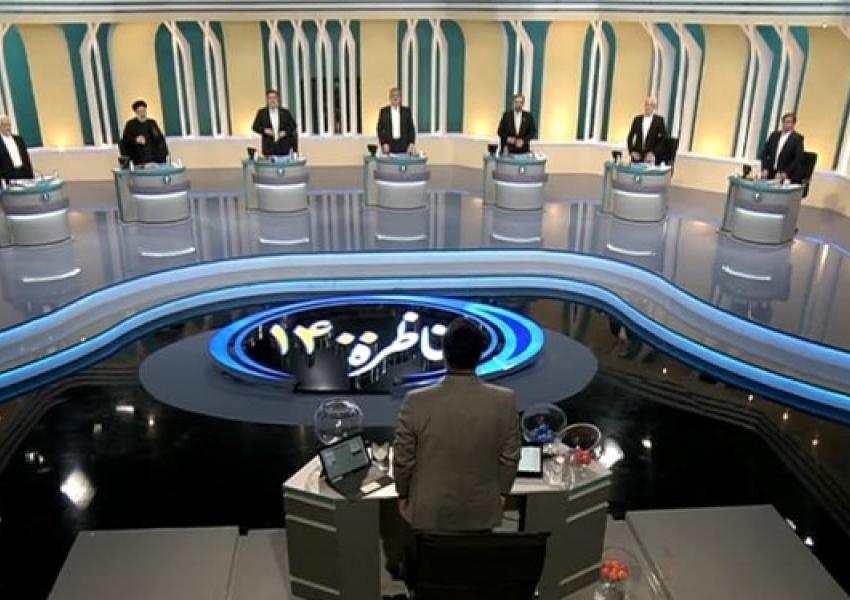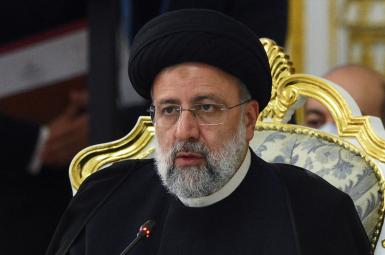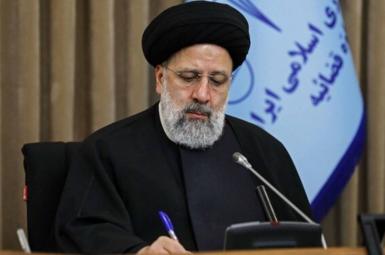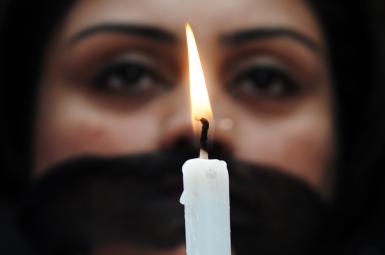
Iran Presidential Debate Avoids Issue Of Sanctions, Nuclear Program
The first of the three televised debates in the run up to Iran’s June 18 controversial presidential elections was mainly a tussle between the five principlist candidates and the former central bank governor Abdolnaser Hemmati, who is backed by the right-of-center Executives of Construction party.
During the three-hour debate Saturday afternoon, the five principlists attacked Hemmati’s record. The former central bank governor in turn alleged the five were coordinating their approach, and that three were standing simply to support the front-runner, Chief Justice Ebrahim Raeesi (Raisi).
Hemmati suggested that the state broadcaster (IRIB) was promoting Raeesi as a "superman" who would solve the country’s economic problems. Raeesi in turn defended his performance as chief justice, accused government officials of dishonesty, and insisted he would be accountable if elected president.
The five principlists – Raeesi, Amir-Hossein Ghazizadeh-Hashemi, Saeed Jalili, Mohsen Rezaei (Rezaee), and Alireza Zakani – avoided criticizing each other but focused on attacking the government of President Hassan Rouhani in general, and Hemmati in particular, for rising liquidity, high inflation and what they said was economic mismanagement.
There was no discussion of United States sanctions, which plunged the economy into recession when introduced in 2018, or talks in Vienna to revive the 2015 nuclear accord, which the US abandoned in 2018 before imposing the sanctions. In a speech to lawmakers last week [May 27], Supreme Leader Ali Khamenei told candidates that voters were more interested in the challenges facing the less well-off rather than foreign policy or access to social media. But foreign policy and the nuclear program have played a major role in Iran’s economic isolation and the consequent hardships.
The reformist candidate, Mohsen Mehralizadeh, like Hemmati adopted an offensive approach focused on Raeesi. He charged that the Chief Justice's education, apart from seminary studies, was limited to six years of primary school. "You can't run the country with six years of [education]," he quipped.
Hemmati attacked Rezaei several times for his role in stalling legislation that would allow Iran to join the conventions of the global money-laundering watchdog, the Financial Action Task Force (FATF). He said he would ask Raeesi as chief justice Raeesi to prosecute Rezaei for "disruption of the economy." Hemmati said Rezaei and bodies run by principlists should leave the economy alone.
Rezaei in turn threatened legal action to prevent Hemmati and other current officials from leaving the country and instead put them on trial. Suggesting "the train of the Revolution [had] got smaller and smaller and turned into a scooter,” Rezaei said the Rouhani administration was "the darkest" in 40 years, and that Hemmati had "collaborated" with US sanctions.
Referring to the disqualification of several presidential hopefuls by the watchdog Guardian Council, Hemmati said "an important part of the society" was not represented by any candidate. Mehralizadeh is running without the endorsement of the umbrella organization, the Reforms Front.
Televised debates may stimulate public interest in an election seen as likely to produce a poor turn-out, perhaps below the previous low of 51 precent in the 1994 election when Akbar Hashemi Rafsanjani won a second term against a single challenger.
A poll by the government-affiliated Iranian Students Polling Agency (ISPA) taken May 30 – June 1, found 34 percent saying they would definitely vote and 8 percent very likely to vote, while 32 percent said they would definitely not vote, and 9 percent that they were unlikely to vote.









